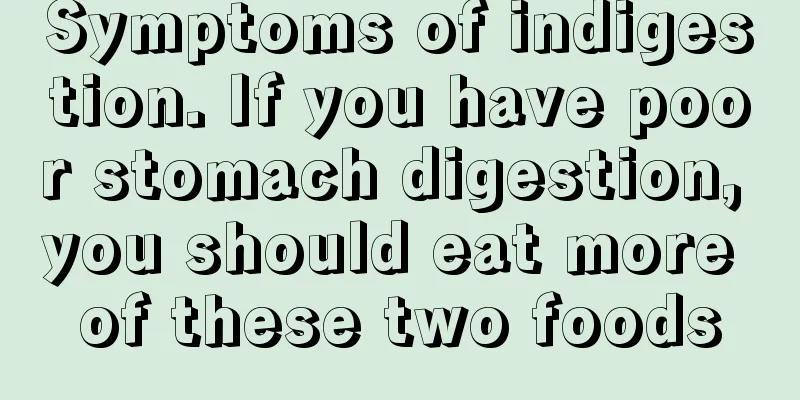Symptoms of indigestion. If you have poor stomach digestion, you should eat more of these two foods

|
In life, many people do not pay attention to protecting their stomachs and intestines. They often overeat, eat foods that are difficult to digest, etc. These situations will cause indigestion. In fact, indigestion also means that the body is beginning to show some other symptoms. So what are the symptoms of stomach indigestion? Let’s learn more about it together. 1. Unexplained weight loss When you are not deliberately trying to lose weight, and you don't do a lot of exercise or your appetite has not decreased, but you look obviously thinner, for example, if you lose more than 5 kilograms, you should be careful. Young people should pay attention to endocrine system diseases such as diabetes and abnormal thyroid function, and people over 40 should be careful about tumors, especially digestive tract tumors. 2. There is a mass when pressing on the upper abdomen Because people have different physical conditions and sensitivities, upper abdominal tenderness may not be accurate, but if a lump is found when pressing and the position is fixed, you should go to the gastroenterology department for treatment in time. In addition, if the high fever persists and is accompanied by pain in the right upper abdomen, one should be alert to acute cholecystitis. 3. Repeated vomiting, hematemesis, and black stools In this type of situation, you should be alert to upper gastrointestinal diseases. The most common cause may be bleeding caused by duodenal ulcer or gastric ulcer. Especially gastric ulcer bleeding caused by elderly people who take aspirin-type anticoagulants and have a history of gastric ulcers. 4. Dysphagia If you have difficulty swallowing solid food at first and then have difficulty swallowing liquid food, you should highly suspect esophageal malignancy. Benign esophageal diseases such as achalasia can also cause dysphagia. 5. Fatigue and weakness When you have a poor appetite, feel tired and weak, it may be anemia, and gastrointestinal bleeding cannot be ruled out. If you experience symptoms such as pale face or dizziness, you should seek medical attention immediately. 6. Shortness of breath, sweating, pain After excluding heart disease and respiratory diseases, you should be careful about gastroesophageal reflux disease. The disease is often accompanied by symptoms such as acid reflux and burning sensation in the upper abdomen. What to eat for indigestion 1. Nuts There are many nuts in our lives. They are rich in nutrients and proper consumption can quickly increase our energy. Foods such as peanuts and almonds contain nutrients that can lower triglycerides in the blood. At the same time, the minerals, vitamins and other nutrients contained in nuts can enhance the body's resistance. However, nuts are not very easy to digest, and eating a moderate amount of them every day is good for the body. Eating more is not healthy. 2. Tea If you have a meal that is too greasy, you can drink a cup of green tea to remove the greasiness. Drinking tea on a regular basis actually has many benefits. |
<<: Causes of pain and lump on the left side of the abdomen
>>: What are the causes of dull pain in the upper left abdomen
Recommend
What are the symptoms of lung disease
The lungs are a very important organ in the human...
Symptoms of deficiency of the five internal organs
When problems occur in the organs inside the body...
What kind of physique does having thick limbs indicate?
In today's world where thinness is considered ...
What is snoring and what causes it
I believe that snoring is a phenomenon that many ...
What to eat to improve memory
Each of us wants to have the ability to remember ...
How to tell if the ear piercing is healed
Nowadays, more and more people are getting their ...
From the white hair area! Get familiar with your physical condition
When talking about gray hair, people always lamen...
What is the reason for constant sweating
There is a disease in life called hyperhidrosis, ...
What causes left foot pain
Feet are an important part of our body and the mo...
HPV52 positive, cervical cancer screening
HPV, or human papillomavirus, is divided into hig...
Life expectancy after uterine cancer surgery is related to the patient's physical function
After uterine cancer surgery, many people want to...
The method of brewing okra flower tea is like this
Okra flower tea is rich in vitamin A and carotene...
How to treat nasopharyngeal carcinoma in the late stage of radiotherapy
How to treat nasopharyngeal carcinoma in the late...
What are the symptoms of okra allergy?
Okra is a food with extremely high nutritional va...
What are the clinical symptoms of advanced esophageal cancer?
What are the symptoms before death from esophagea...









